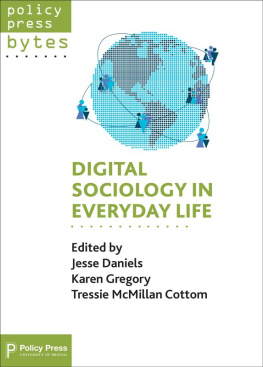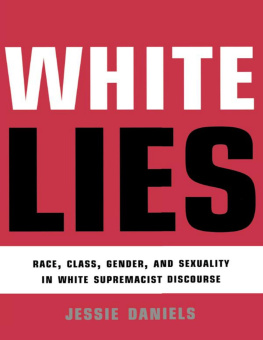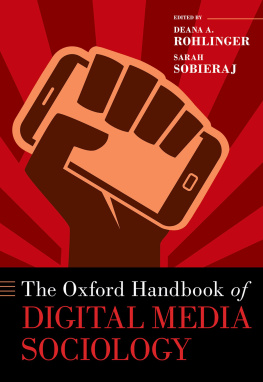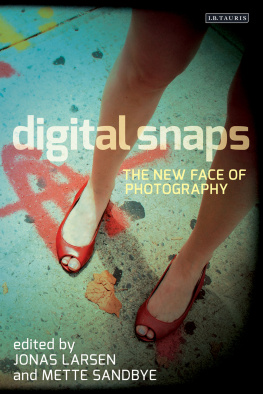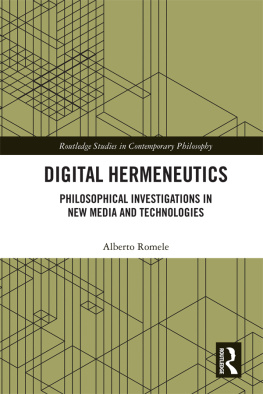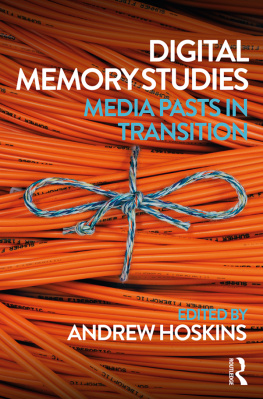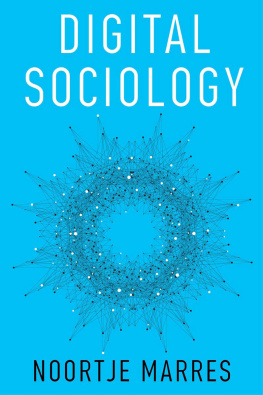DIGITAL SOCIOLOGY IN EVERYDAY LIFE
Edited by
Jessie Daniels
Karen Gregory
Tressie McMillan Cottom

First published in Great Britain in 2017 by
Policy Press University of Bristol 1-9 Old Park Hill Bristol BS2 8BB UK Tel +44 (0)117 954 5940 e-mail pp-info@bristol.ac.uk www.policypress.co.uk
North American office: Policy Press c/o The University of Chicago Press 1427 East 60th Street Chicago, IL 60637, USA t: +1 773 702 7700 f: +1 773-702-9756 e:sales@press.uchicago.edu www.press.uchicago.edu
Policy Press 2017
British Library Cataloguing in Publication Data
A catalogue record for this book is available from the British Library.
Library of Congress Cataloging-in-Publication Data
A catalog record for this book has been requested.
ISBN 978-1-4473-2905-3 ePub
ISBN 978-1-4473-2906-0 Mobi
The right of Jessie Daniels, Karen Gregory and Tressie McMillan Cottom to be identified as editors of this work has been asserted by them in accordance with the 1988 Copyright, Designs and Patents Act.
All rights reserved: no part of this publication may be reproduced, stored in a retrieval system, or transmitted in any form or by any means, electronic, mechanical, photocopying, recording, or otherwise without the prior permission of Policy Press.
The statements and opinions contained within this publication are solely those of the editors and contributors and not of The University of Bristol or Policy Press. The University of Bristol and Policy Press disclaim responsibility for any injury to persons or property resulting from any material published in this publication.
Policy Press works to counter discrimination on grounds of gender, race, disability, age and sexuality.
Permission to use the opening quote on p 195, Chapter 13, from Athique, A. (2013) Digital media and society:
An introduction. Malden, MA: Polity Press, was granted by Polity Press.
Cover design by Policy Press
Front cover: image kindly supplied by istock
Readers Guide
This book has been optimised for PDA.
Tables may have been presented to accommodate this devices limitations.
Image presentation is limited by this devices limitations.
Also available
Digital Bodies, Digitized Institutions
The complete volume, Digital sociologies edited by Jessie Daniels, Karen Gregory and Tressie McMillan Cottom includes an introduction from the editors and a preface from Saskia Sassen. See http://policypress.co.uk/digital-sociologies for more details.
Notes on the authors
Harry T. Dyer (MRes) is a PhD candidate and Associate Tutor at the University of East Anglia, UK. He has published articles on identity presentation in social media and is currently finishing his PhD focusing on the effects of online site and app design on identity performances. Harry blogs at HarryTDyer.com and can be found on Twitter @HarryTDyer.
Jessie Daniels is Professor of Sociology and Critical Social Psychology at Hunter College and The Graduate Center, CUNY. She has published five books, including White lies (Routledge, 1997) and Cyber racism (Rowman & Littlefield, 2009), along with dozens of peer-reviewed journal articles. Some of her writing has been published in The New York Times. Daniels blogs at Racism Review (www.racismreview.com), and hangs out on Twitter (@JessieNYC). Around the edges of her day job, she writes memoirs.
Karen Gregory, PhD, is a Lecturer in Digital Sociology at the University of Edinburgh, UK, where she directs the MA program in digital society. Her research explores the possibilities for solidarity in a digital economy and her writings have appeared in Workplace: The Journal For Academic Labor, Womens Studies Quarterly, Women and Performance, Visual Studies, Contexts, The New Inquiry, and Dis Magazine. You can find her on Twitter @claudiakincaid.
Theresa A. Hunt, PhD, is a University Lecturer in Humanities and Science, Technology and Society at New Jersey Institute of Technology in Newark. She holds an MA in English and PhD in Global Affairs, both from Rutgers University. Dr Hunts current research investigates the use of gender, youth, and technology narratives in global activism, as well as the history of youth organizing in transnational social justice movements. Her work has appeared most recently in Womens Studies International Forum.
Trevor Jamerson is a PhD student at Virginia Tech currently teaching American Indian and African American Studies. His research interests include race and tourism studies, indigenous studies, and digital sociology. He is presently working on a review article for the Sociology Compass discussing intersections of critical race and tourism studies.
Alexia Maddox, PhD, is a Research Librarian at Deakin University and research consultant at RMIT University. She is author of Research methods and global online communities: A case study (Routledge, 2015), and has published articles on the nexus between community, digital frontiers, and research methods. Maddox blogs at alexiamaddox.com and can be found on Twitter @alexiamadd.
Alison Mayne is an amateur textile maker and a doctoral researcher in womens crafting experiences at Sheffield Hallam University, UK. She is undertaking PhD research into experiences of wellbeing in amateur knit and crochet craftswomen who make alone but share in online yarn groups. She blogs at newbieresearcher.wordpress.com and can be found on Twitter @newbiephd.
Tressie McMillan Cottom, PhD, is an Assistant Professor of Sociology at Virginia Commonwealth University and Faculty Associate with Harvard Universitys Berkman Klein Center for Internet & Society. Her research on higher education, work, and technological change in the new economy has been supported by the Microsoft Research Networks Social Media Collective, The Kresge Foundation, the American Educational Research Association and the UC Davis Center for Poverty Research. Millions List, a leader in publishing, named her book Lower ed: The troubling rise of for-profit colleges in the new economy one of the most anticipated non-fiction books of 2016.
Alexandrea J. Ravenelle is completing her dissertation, Hustle: The lived experience of workers in the sharing economy in the Sociology Department at The Graduate Center, City University of New York. Her work explores the lives of workers for Airbnb, Uber, Taskrabbit and Kitchensurfing.
Timothy Recuber, PhD, is a Visiting Assistant Professor in the Communication Department at Hamilton College. He is the author of Consuming catastrophe: Mass culture in Americas decade of disaster (Temple University Press, 2016), and has published a variety of articles on digital culture and mass media.
Structure and agency in a digital world
Karen Gregory
Digital technologies, digital media, and mobile technologies now shape and influence the nature and experience of everyday life in the Western world. Technologies ranging from personal devices to sensors in our shared environments have brought with them an era of ubiquitous computing, data gathering, and data analysis. Such an era may even be ushering in a new onto-logic of sociality or the social itself (Clough et al, 2014: 147). Learning to live in and through these media, learning to both maximize their potential, as well as resist their domination of time, attention, and labor is an ongoing challenge for many individuals (Wajcman, 2015). New forms of technology and digital media are often presented by their creators as time saving or life hacking, as expanding access to goods and resources, or increasing personal choice. They may even be presented as liberatory. Yet the reality of our entanglement with digital media is far from clearly understood.
Next page
